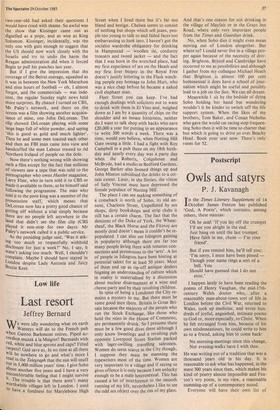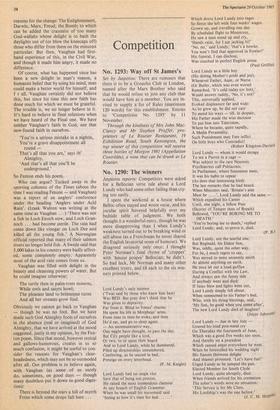Postscript
Owls and satyrs
P. J. Kavanagh In the Times Literary Supplement of 14 October James Fenton has published 'God, A Poem', which contains, among others, these stanzas: Oh he said: 'If you lay off the crumpet I'll see you alright in the end.
Just hang on until the last trumpet. Have faith in me, chum — I'm your friend'.
But if you remind him, he'll tell you: 'I'm sorry, I must have been pissed — Though your name rings a sort of a bell. You Should have guessed that I do not exist.'
I happen lately to have been reading the poems of Henry Vaughan, the mid-17th- century Welsh doctor who, after a reasonably man-about-town sort of life in London before the Civil War, returned to Wales, took up medicine, and wrote hun- dreds of joyful, anguished, intimate poems to God or, more especially, to Christ. When he felt estranged from him, because of his own misdemeanours, he could write to him as to a friend, asking him to come back: No morning-meetings since this change, Nor evening-walks have I with thee.
He was writing out of a tradition that was a thousand years old in his day. It is reasonable to ask what has happened, in the mere 300 years since then, which makes his kind of poetry almost impossible and Fen- ton's wry poem, in my view, a reasonable summing-up of a contemporary mood.
Everyone will have their own list of reasons for the change: The Enlightenment, Darwin, Marx, Freud, the Bomb; to which can be added the crassness of too many God-wallahs whose delight is to bash the daylights out of (or blow the kneecaps off) those who differ from them on the minutest particular. But then, Vaughan had first- hand experience of this, in the Civil War, and though it made him angry, it made no difference.
Of course, what has happened since has been a new delight in man's reason, a humanist belief that by using his mind, man could make a better world for himself, and f r all. Vaughan certainly did not believe this, but since his time this new faith has done much for which we must be grateful. The trouble is, we no longer believe in it. It's hard to believe in final solutions when we have heard of the Final one. We have neither Vaughan's faith in God, nor that new-found faith in ourselves.
'You're a serious mistake in a nightie, You're a grave disappointment all round — That's all that you are,' says th' Almighty, 'And that's all that you'll be underground.'
So Fenton ends his poem.
Who can argue? Tucked away in the sporting columns of the Times (about the time I was reading Fenton — and Vaughan) was a report of an anglers' conference under the heading 'Anglers under Acid Rain'. (Izaak Walton was writing at the same time as Vaughan ...) 'There was not a fish in Loch Enoch now, and Loch Gran- noch ... had become sterile. The rain had come down like vinegar on Loch Dee and killed all the young fish.' A Norwegian official reported that many of their salmon rivers no longer held fish. A Swede said that 5,000 lakes in his country were badly affect- ed, some completely empty. Apparently most of the acid rain comes from us.
Vaughan was filled with delight in the beauty and cleansing powers of water. But he could imagine otherwise: The turtle then in palm-trees mourns, While owls and satyrs howl; The pleasant land to brimstone turns And all her streams grow foul.
Obviously we cannot go back to Vaughan — though he was no fool. But we have made such God Almighty fools of ourselves in the absence (real or imagined) of God Almighty, that we have arrived at the mood suggested, justly in my opinion, by the Fen- ton poem. Since that mood, however stoical and gallows-humorous, creates in us so much confusion, it might be useful to con- sider the reasons for Vaughan's clear- headedness, which may not be so outmoded after all. Our problem is to believe again, with Vaughan (as some of us surely do, sometimes, on good days — though many doubtless put it down to good diges- tion): There is beyond the stars a hill of myrrh From which some drops fall here ...















































 Previous page
Previous page